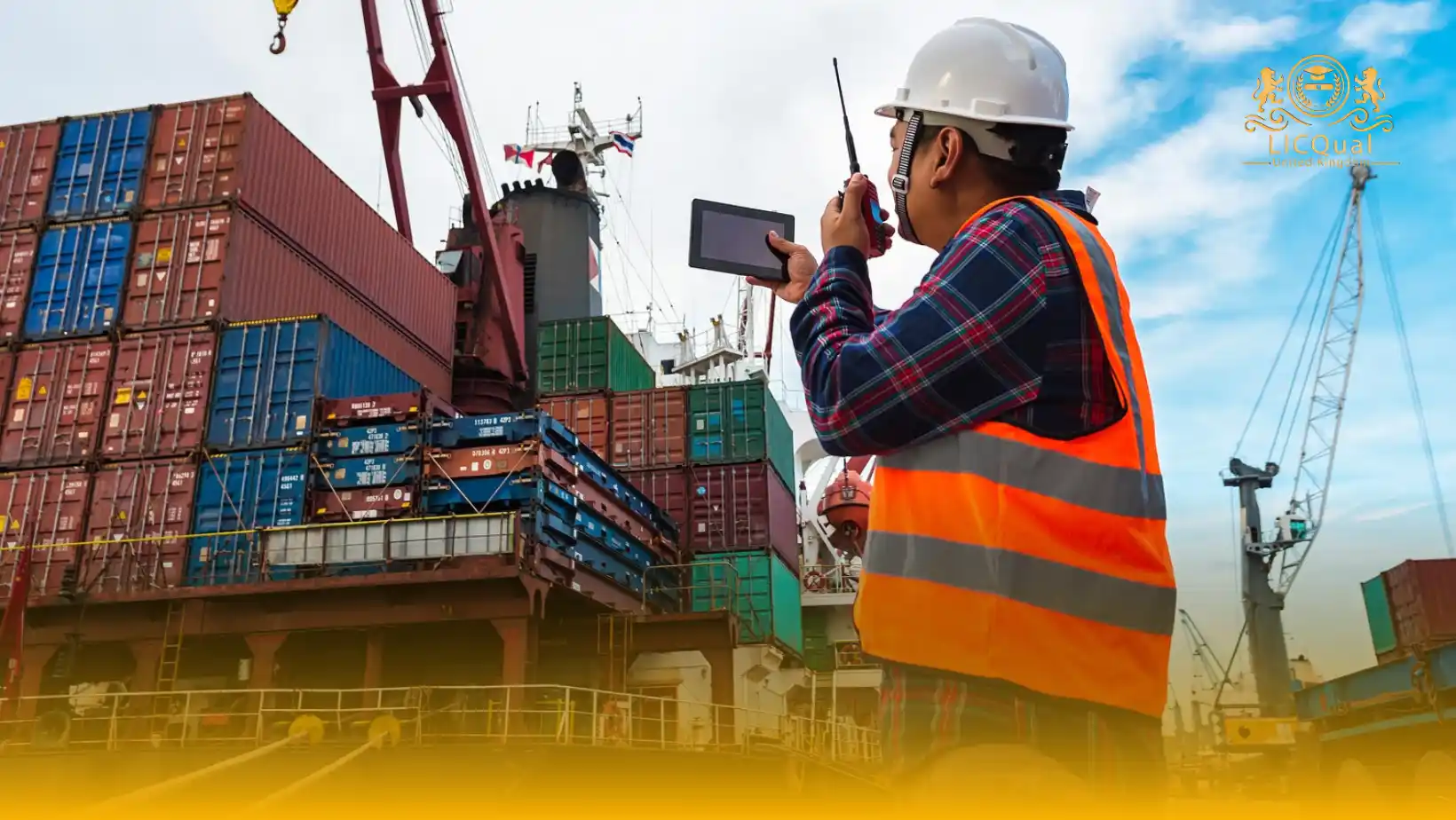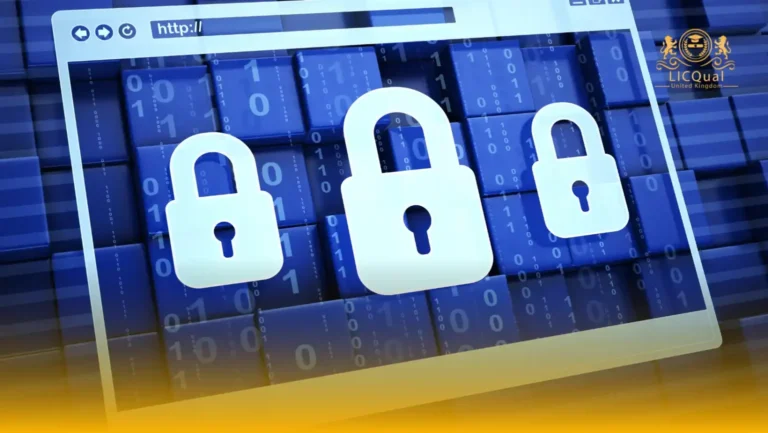The LICQual UK Level 3 Diploma in Port Operations is a UK accredited qualification designed for professionals who want to build a strong foundation in port and terminal management. This internationally recognized program provides the essential knowledge and practical skills needed to succeed in the fast‑paced world of shipping, logistics, and cargo handling. Whether you are already working in the maritime sector or planning a career change into port operations, this diploma offers a clear pathway to professional growth.
Ports are the lifeline of global trade, connecting supply chains and driving economic activity across the world. The Level 3 Diploma in Port Operations UK introduces learners to the core functions of port facilities, including cargo handling, storage, safety, and customer service. You will explore how ports operate within international trade networks, understand the role of technology in modern terminals, and learn how to apply best practices in compliance, safety, and environmental sustainability.
Delivered through flexible online study, the program is designed to fit around professional commitments, making it ideal for those who want to upskill without interrupting their careers. The curriculum is aligned with international standards, ensuring that your qualification is recognized and valued across the global maritime industry.
What makes this course stand out is its practical focus. From cargo handling procedures to port security and environmental awareness, every unit is designed to provide real‑world knowledge that can be applied immediately in the workplace. By completing the LICQual UK Level 3 Diploma in Port Operations, you will gain the confidence and expertise to take on roles in port management, logistics, and supply chain operations.
If you are looking for a flexible, career‑focused, and globally recognized qualification, this diploma is your gateway to success in the dynamic world of port and terminal operations.
Course Overview
Qualification Title
LICQual UK Level 3 Diploma in Port Operations
Total Units
6
Total Credits
60
GLH
240
Qualification #
LICQ2201307
Qualification Specification
To enroll in the LICQual UK Level 3 Diploma in Port Operations, applicants must meet the following criteria:
|
Qualification# |
Unit Title |
Credits |
GLH |
|---|---|---|---|
|
LICQ2201307-1 |
Introduction to Port and Terminal Operations |
10 |
40 |
|
LICQ2201307-2 |
Health, Safety, and Security in Port Operations |
10 |
40 |
|
LICQ2201307-3 |
Cargo Handling and Storage Procedures |
10 |
40 |
|
LICQ2201307-4 |
Port Equipment and Technology |
10 |
40 |
|
LICQ2201307-5 |
Customer Service and Communication in Ports |
10 |
40 |
|
LICQ2201307-6 |
Environmental Awareness in Port Operations |
10 |
40 |
By the end of this course, learners will be able to:
Unit 1: Introduction to Port and Terminal Operations
By the end of this unit, learners will be able to:
- Explain the core functions of ports and terminals in global trade and logistics.
- Identify the roles of key stakeholders in port and terminal operations.
- Demonstrate understanding of cargo flow, vessel scheduling, and port services.
- Apply basic operational principles to real‑world port scenarios.
- Evaluate the importance of ports in international supply chain management.
- Recognize the impact of port efficiency on trade competitiveness.
Unit 2: Health, Safety, and Security in Port Operations
By the end of this unit, learners will be able to:
- Apply international safety standards and the ISPS Code in port environments.
- Identify common workplace hazards and implement risk control measures.
- Demonstrate knowledge of emergency response and crisis management procedures.
- Evaluate the importance of occupational health and safety in port operations.
- Promote a culture of safety and compliance within port teams.
- Assess the role of security in protecting cargo, vessels, and personnel.
Unit 3: Cargo Handling and Storage Procedures
By the end of this unit, learners will be able to:
- Explain the principles of cargo handling, storage, and inventory management.
- Apply safe and efficient procedures for loading, unloading, and warehousing.
- Demonstrate knowledge of containerization and multimodal transport systems.
- Evaluate the impact of cargo handling efficiency on supply chain performance.
- Identify risks in cargo storage and recommend preventive measures.
- Use industry best practices to improve cargo flow and minimize delays.
Unit 4: Port Equipment and Technology
By the end of this unit, learners will be able to:
- Identify key port equipment such as cranes, forklifts, and automated systems.
- Demonstrate safe and effective use of port machinery in daily operations.
- Explain the role of digital technologies in modern port management.
- Evaluate the benefits of automation and smart port solutions.
- Apply knowledge of equipment maintenance to ensure operational reliability.
- Assess how technology improves efficiency, safety, and sustainability in ports.
Unit 5: Customer Service and Communication in Ports
By the end of this unit, learners will be able to:
- Demonstrate effective communication with shipping lines, agents, and stakeholders.
- Apply customer service principles to enhance client satisfaction in port operations.
- Evaluate the importance of cultural awareness in international port interactions.
- Use negotiation and problem‑solving skills to resolve service issues.
- Develop strategies to strengthen relationships with port customers and partners.
- Assess the role of communication in building trust and operational efficiency.
Unit 6: Environmental Awareness in Port Operations
By the end of this unit, learners will be able to:
- Explain the environmental impact of port activities on air, water, and ecosystems.
- Apply international environmental standards such as MARPOL in port operations.
- Demonstrate knowledge of pollution prevention and waste management practices.
- Evaluate the importance of sustainability in modern port management.
- Recommend strategies for reducing carbon emissions and improving green practices.
- Assess the role of ports in supporting global environmental protection goals.
The LICQual UK Level 3 Diploma in Port Operations is designed for professionals who want to strengthen their expertise in port management, logistics, and cargo handling. It is particularly valuable for individuals seeking career advancement, transitioning into port operations, or enhancing their role in global trade and supply chains. This diploma provides practical, workplace‑ready knowledge that can be applied immediately, making it ideal for career changers and industry professionals.
Logistics and Supply Chain Professionals
- Gain specialized knowledge of port operations to complement logistics expertise.
- Understand cargo flow, warehousing, and multimodal transport systems.
- Strengthen decision‑making in supply chain and distribution networks.
- Improve efficiency in cargo handling and storage procedures.
- Enhance career prospects in international logistics and trade.
Port and Terminal Staff Advancing Careers
- Build a structured understanding of port and terminal operations.
- Learn best practices in safety, security, and environmental compliance.
- Strengthen operational skills for supervisory or management roles.
- Improve communication with shipping lines, agents, and stakeholders.
- Position yourself for leadership opportunities in port operations.
Shipping and Freight Forwarding Professionals
- Understand the legal and operational aspects of cargo handling.
- Strengthen knowledge of port documentation and compliance requirements.
- Improve coordination between shipping companies and port authorities.
- Apply international standards to freight and cargo management.
- Enhance credibility in global shipping and forwarding services.
Health, Safety, and Security Officers
- Apply international safety standards and ISPS Code in port environments.
- Strengthen risk management and emergency response skills.
- Promote a culture of safety and compliance within port operations.
- Manage workplace hazards and implement preventive measures.
- Enhance professional standing in safety and security roles.
Customer Service and Operations Coordinators
- Develop strong communication skills for port and shipping stakeholders.
- Apply customer service principles to improve client satisfaction.
- Resolve operational issues through negotiation and problem‑solving.
- Strengthen cultural awareness in international port interactions.
- Build long‑term relationships with clients and partners.
Environmental and Sustainability Officers
- Understand the environmental impact of port operations.
- Apply MARPOL and international environmental standards.
- Promote sustainable practices in cargo handling and storage.
- Develop strategies to reduce emissions and pollution in ports.
- Strengthen compliance with global sustainability frameworks.
Career Changers Entering Port Operations
- Transition into the maritime and logistics sector with a UK‑accredited qualification.
- Gain practical knowledge of port operations, cargo handling, and safety.
- Build confidence in applying international standards to real‑world roles.
- Strengthen employability in shipping, logistics, and port management.
- Position yourself for new career opportunities in global trade.
Assessment and Verification
All units within this qualification are subject to internal assessment by the approved centre and external verification by LICQual. The qualification follows a criterion-referenced assessment approach, ensuring that learners meet all specified learning outcomes.
To achieve a ‘Pass’ in any unit, learners must provide valid, sufficient, and authentic evidence demonstrating their attainment of all learning outcomes and compliance with the prescribed assessment criteria. The Assessor is responsible for evaluating the evidence and determining whether the learner has successfully met the required standards.
Assessors must maintain a clear and comprehensive audit trail, documenting the basis for their assessment decisions to ensure transparency, consistency, and compliance with quality assurance requirements.







